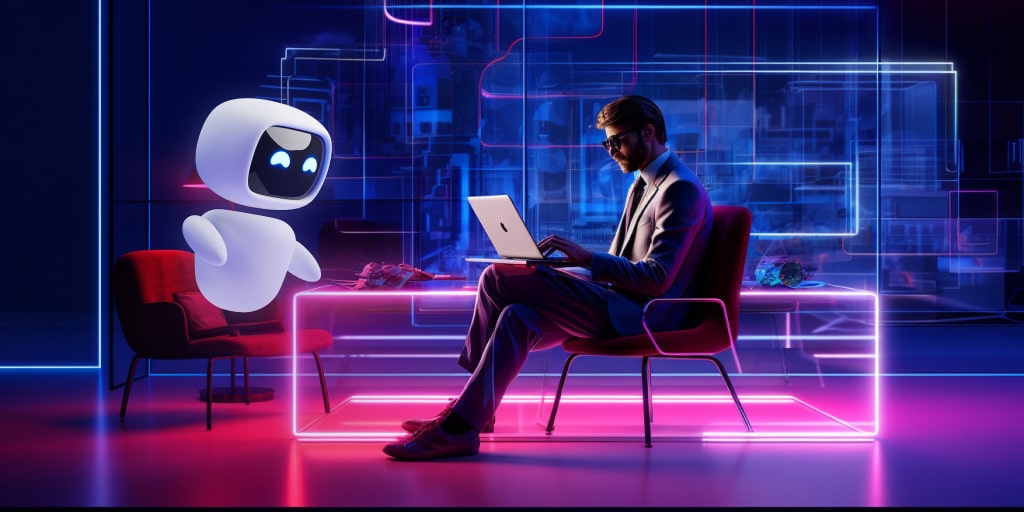The Future of Work: What Jobs Will Look Like in 2050
The landscape of work is continuously evolving, influenced by technological advancements, demographic shifts, and societal changes. By 2050, the world of work will be markedly different from today.
This article explores the potential future of jobs, examining the roles of automation, artificial intelligence (AI), demographic trends, and the changing nature of workspaces.
Through this exploration, we gain insight into how to prepare for and adapt to these transformations.
Automation and AI: The New Workforce
 Automation and AI are poised to revolutionize the job market, reshaping roles and industries in unprecedented ways. By 2050, these technologies will not only enhance productivity but also redefine the human workforce.
Automation and AI are poised to revolutionize the job market, reshaping roles and industries in unprecedented ways. By 2050, these technologies will not only enhance productivity but also redefine the human workforce.
The Rise of Automation
Automation will streamline repetitive and manual tasks, leading to increased efficiency across various sectors. Jobs involving routine tasks, such as manufacturing and data entry, will see significant automation, potentially reducing the need for human labor in these areas.
However, this shift will also create opportunities for new types of work, requiring humans to oversee, manage, and improve automated systems.
AI-Powered Professions
AI's capabilities will extend beyond automation, playing a critical role in decision-making processes and complex problem-solving. Professions in fields like healthcare, finance, and law will increasingly rely on AI to analyze vast amounts of data, identify patterns, and provide insights.
AI will assist doctors in diagnosing diseases, financial analysts in predicting market trends, and lawyers in reviewing legal documents.
Job Creation and Transformation
While some jobs will be automated, new roles will emerge. AI and automation will create demand for jobs in AI development, robotics maintenance, and cybersecurity.
Additionally, there will be a growing need for professionals who can interpret and act upon AI-generated data, blending technical skills with human intuition and creativity.
Demographic Shifts: An Aging and Diverse Workforce
 Demographic changes will significantly impact the workforce by 2050. An aging population, increased diversity, and shifting migration patterns will shape the types of jobs available and how they are performed.
Demographic changes will significantly impact the workforce by 2050. An aging population, increased diversity, and shifting migration patterns will shape the types of jobs available and how they are performed.
The Aging Workforce
As life expectancy increases, more people will remain in the workforce longer. This trend will necessitate adaptations in workplace policies and practices to accommodate older workers.
Companies will need to offer flexible work arrangements, continuous learning opportunities, and age-friendly work environments to retain and support experienced employees.
Embracing Diversity
Workforces will become more diverse, with greater representation of different genders, ethnicities, and cultures. This diversity will drive innovation and creativity, as varied perspectives contribute to problem-solving and decision-making.
Employers will need to foster inclusive workplaces, where all employees feel valued and empowered to contribute.
Migration and Global Talent
Global migration will continue to influence the workforce, as people move across borders in search of better opportunities. This mobility will lead to a more interconnected and multicultural workforce, with employees bringing diverse skills and experiences to their roles.
Companies will benefit from accessing a global talent pool, but they will also need to navigate the complexities of managing a geographically dispersed team.
The Evolving Nature of Workspaces
The traditional office environment is changing, giving way to more flexible and dynamic workspaces. By 2050, workspaces will be designed to accommodate various work styles and enhance productivity and well-being.
Remote and Hybrid Work
The COVID-19 pandemic accelerated the adoption of remote work, a trend that will continue to evolve. By 2050, remote and hybrid work models will be the norm, offering employees the flexibility to work from anywhere.
This shift will require advancements in communication technologies and collaboration tools to ensure seamless connectivity and teamwork.
Smart Workspaces
Workspaces will become smarter, integrating technology to create more efficient and responsive environments. Internet of Things (IoT) devices will monitor and adjust lighting, temperature, and air quality to optimize comfort and productivity.
AI-driven systems will manage meeting schedules, room bookings, and resource allocation, enhancing the overall work experience.
Wellness and Work-Life Balance
The focus on employee well-being will intensify, with workspaces designed to promote physical and mental health. Employers will offer amenities like fitness centers, meditation rooms, and green spaces to encourage a healthy work-life balance.
Flexible work hours and mental health support will be essential components of the future workplace, helping employees manage stress and maintain their well-being.
Skills for the Future: Lifelong Learning and Adaptability
The future job market will demand a new set of skills, emphasizing adaptability, continuous learning, and emotional intelligence. To thrive in 2050, workers must be prepared to evolve alongside technological and societal changes.
Lifelong Learning
With rapid advancements in technology, the half-life of skills is shrinking. By 2050, continuous learning will be a necessity, with individuals needing to update their skills regularly to remain relevant.
Education systems and employers will play a crucial role in providing opportunities for reskilling and upskilling, ensuring that workers can adapt to new demands.
Emotional Intelligence and Soft Skills
As automation takes over routine tasks, the value of human-centric skills will increase. Emotional intelligence, creativity, critical thinking, and problem-solving abilities will be essential in navigating complex and dynamic work environments.
Employers will seek individuals who can collaborate effectively, communicate clearly, and lead with empathy.
Technical and Digital Literacy
While soft skills will be crucial, technical and digital literacy will also be imperative. Workers will need to understand and leverage emerging technologies, such as AI, blockchain, and advanced data analytics. Proficiency in coding, data analysis, and digital tools will be fundamental in many professions.
Adaptability and Resilience
The future job market will be characterized by constant change. Workers will need to be adaptable and resilient, capable of navigating uncertainty and embracing new challenges.
Developing a growth mindset, where individuals see challenges as opportunities for growth, will be vital for long-term career success.
Conclusion
The future of work in 2050 will be shaped by technological advancements, demographic shifts, and evolving work environments.
Automation and AI will transform the job market, creating new roles and requiring continuous learning. An aging and diverse workforce will drive innovation and inclusivity, while smart and flexible workspaces will enhance productivity and well-being.
To thrive in this dynamic landscape, workers must cultivate a blend of technical, digital, and human-centric skills, embracing lifelong learning and adaptability. By understanding these trends and preparing for the future, individuals and organizations can navigate the changing world of work and seize new opportunities.
Sources
- Harvard Business Review: The Future of Work
- BBC Worklife: How the Future of Work Could Look by 2050
- MIT Technology Review: The Future of Work
- CNBC: The future of work after COVID-19





























